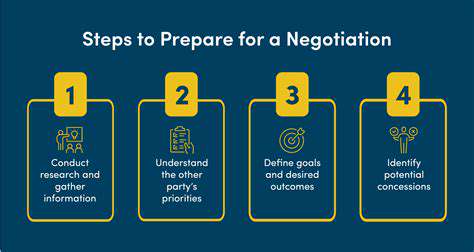How to Negotiate Prices in Foreign Markets [Cultural Tips]
Decoding Different Bargaining Styles
Understanding the Cultural Context
Negotiation styles are deeply rooted in cultural norms and values. Understanding the cultural context of your foreign market is crucial for success. Different cultures have varying expectations regarding communication styles, decision-making processes, and the importance of relationships. For example, some cultures may value direct and assertive communication, while others prefer indirect and nuanced approaches. Failing to recognize these differences can lead to misunderstandings and ultimately, unsuccessful negotiations.
Researching the specific cultural nuances of your target market is essential. This includes understanding their business etiquette, hierarchy structures, and preferred methods of communication. Knowing these factors allows you to tailor your approach to improve your chances of achieving a mutually beneficial outcome.
Identifying Your Own Style
Before engaging in negotiations, self-assessment is key. Reflect on your own communication style and determine how it aligns with the cultural norms of the foreign market. Are you more assertive or collaborative? Do you prefer to build relationships or focus solely on the transaction? Understanding your own strengths and weaknesses will help you identify strategies to adapt your style accordingly.
A clear understanding of your personal negotiating style is essential for success. Acknowledging your tendencies, whether it's a preference for aggressive or patient tactics, will allow you to anticipate and address potential challenges in the negotiation process.
The Importance of Patience and Persistence
Negotiations in foreign markets often require more time and patience than domestic negotiations. Building trust and rapport takes time, and rushing the process can hinder the chances of achieving a favorable outcome. Be prepared to engage in multiple rounds of discussions and be persistent in your efforts to reach an agreement.
Adapting to Different Communication Styles
Effective communication is paramount in any negotiation, and this is especially true in foreign markets. Pay close attention to verbal and nonverbal cues, and be mindful of potential language barriers. If necessary, seek professional translation services to ensure accurate and clear communication.
Leveraging Local Expertise
Gaining insights from local experts can significantly enhance your negotiation strategies. Partnering with someone who understands the market's intricacies, cultural nuances, and established business practices can provide invaluable guidance and support. This can involve working with a local consultant or business contact who can act as an intermediary.
Recognizing Power Dynamics
In many foreign markets, power dynamics play a significant role in negotiations. Understanding the relative power of the parties involved is critical. Acknowledge the potential influence of factors such as economic strength, political standing, or social status. Adjust your approach accordingly to navigate these complexities effectively.
Building Relationships for Long-Term Success
In some cultures, establishing strong relationships is a fundamental aspect of negotiation. Focus on building rapport and trust with your counterparts. This will foster a collaborative environment and increase the likelihood of achieving a mutually beneficial agreement. Recognize that building lasting relationships might require more time and effort than simply focusing on the immediate transaction.
Strategies for Successful Price Negotiations in Foreign Markets

Understanding Customer Value Perception
A critical first step in successful price negotiation is understanding how your customers perceive the value of your product or service. This involves more than just the intrinsic features; it encompasses the perceived benefits, the emotional connection, and the overall experience associated with your offering. Thorough market research and customer feedback are crucial for identifying the specific factors that drive value perception. Understanding these nuances allows you to tailor your pricing strategy to align with the customer's perceived worth.
Essentially, you must move beyond a purely transactional approach and focus on building a relationship centered around value creation. By understanding your customers' desires, you can more effectively communicate the benefits of your offering and justify a price that reflects this value proposition.
Developing a Comprehensive Pricing Strategy
A robust pricing strategy goes beyond simply setting a price; it requires a comprehensive understanding of your costs, market conditions, and competitor pricing. This entails meticulous cost analysis to determine the true break-even point and the profit margin you need to achieve your financial goals. Analyzing competitor pricing provides insights into market benchmarks and allows you to position your pricing strategically within the competitive landscape.
Market research is essential for understanding customer willingness to pay, and you need to carefully consider how your price impacts your overall market share and brand perception.
Negotiation Tactics for Maximizing Value
Effective negotiation tactics involve more than just reciting figures; it's about building rapport and understanding your customer's needs. Actively listening and asking clarifying questions can reveal underlying concerns and unmet needs. This allows you to tailor your offering and pricing to address these concerns and present a solution that benefits both parties.
Offering flexible payment options or tiered pricing structures can be valuable negotiation tools. Furthermore, being prepared to walk away from a deal that doesn't meet your profitability targets is crucial for maintaining your company's long-term value.
Adapting to Changing Market Dynamics
The business landscape is constantly evolving, and a successful price negotiation strategy must be adaptable to changing market dynamics. Economic fluctuations, shifts in consumer demand, and emerging competitor strategies all require careful monitoring and prompt adjustments to pricing models. Staying informed about these changes and adjusting your approach accordingly will help ensure your pricing remains competitive and relevant.
Regular market analysis and competitor benchmarking are paramount to understanding the evolving market landscape. This proactive approach enables you to maintain a flexible and responsive pricing strategy that adapts to market realities.
Building Strong Relationships for Future Negotiations
Successful price negotiation isn't just a one-time event; it's about building long-term relationships. Focusing on building rapport and trust with your customers fosters stronger, more collaborative partnerships. This fosters a sense of mutual respect and understanding, which can lead to more favorable outcomes in future negotiations. Providing exceptional customer service and exceeding expectations can cultivate a positive perception of your company, leading to repeat business and positive word-of-mouth referrals.
Cultivating this type of relationship also allows for more open communication, which is essential for understanding evolving needs and maintaining competitive pricing. This type of rapport helps your company anticipate future needs and establish trust which is invaluable.




![Exploring Medieval Castles in Europe [Historical Tour]](/static/images/27/2025-06/AJourneyThroughTime3AFamousCastlesandTheirStories.jpg)





![Best Travel Credit Cards for Lounge Access [2025]](/static/images/27/2025-07/AnalyzingSpecificCardFeaturesfor2025.jpg)